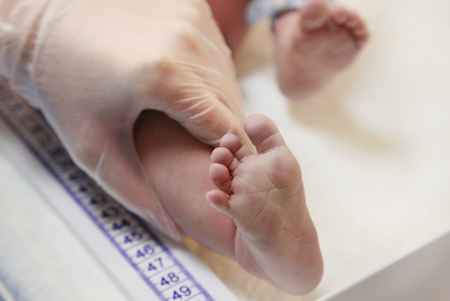Dr Sarah Arrowsmith, who gained her PhD from the University in 2010, has a long-standing interest in the role of the uterus during pregnancy and labour.
Her current project is evaluating treatments received by women experiencing preterm labour contractions and how they affect the uterus to stop these contractions. Dr Arrowsmith’s work aims to improve these treatments, which can be ineffective.
Hospital-based research centre
The Harris-Wellbeing Centre, a collaboration between Liverpool Women’s Hospital and the University of Liverpool, is a specialist research centre in preterm birth. The centre opened its doors in 2014, and Sarah has been working on her current project there for three years. Being situated within a hospital means she is able to take live samples from its patients, enriching her research.
Sarah says: “My laboratory is extremely well-situated – in the biggest maternity hospital in the UK and Europe where approximately 8000 babies are delivered per year. Our labs are right next door to the maternity wards enabling us to build great relationships with the clinical teams there to find out about the problems women are encountering in labour and access to tissues for testing.”

While studying for her PhD, Sarah was one of those responsible for setting up a tissue bank shared between the University and Liverpool Women’s Hospital, to enable tissue to be stored for future studies in addition to the fresh tissue used for daily experiments.
“This great asset took quite a lot of setting up, taking into account required ethical permissions and the fact that patients are not just consenting to one project, but potentially multiple future projects.
“Our team of basic scientists and clinical scientists brings about joined-up thinking coordinating what’s actually happening in hospital and what we do. We want to make sure we are actually investigating the right things, and that what we’re doing is not only interesting to us as scientists but also of benefit to the clinic and its patients.”
Career Development
Sarah actively pursues opportunities for her own career development and encourages others to follow suit, through formal workshop and seminar settings, and also by encouraging researchers to socialise and network at informal social events.
Sarah has taken up a number of University committee roles including Post-doc faculty representative on the Concordat Steering Group, Co-chair of the Research Staff Association, President of Institute for Translational Medicine (ITM)’s post-doc network and as a Post-doc representative on ITM’s Athena Swan Self-Assessment Team.
She has been instrumental in instigating a series of linked interventions aimed at increasing the engagement of Early Career Researchers (ECRs) in organisational processes, with the intention of increasing recognition of their role and contribution within the wider University community. Sarah is currently Co-Chair of the University’s Research Staff Association (RSA), helping to facilitate communication, networking and development amongst research staff university-wide.
Sarah says: “The RSA is run by ECRs for ECRs. We’ve held a number of events to build collaborations between different faculties across the University, and work collaboratively on ideas for enhancing professional development and promoting wellbeing for researchers at Liverpool.”
“The RSA and the Concordat Steering Group on which I also sit are both focused on developing careers for our researchers, and several of the ECRs we are supporting are themselves involved in the two groups. Information and feedback from these researchers forms an important part of the dialogue with and between both groups. Helping to facilitate that is important to me.”
Championing parental rights
As Post-doctoral representative on ITM’s Athena Swan Self-Assessment Team, Sarah helped to produce a maternity, paternity and adoptive leave booklet to inform researchers in ITM of their entitlements, where to seek advice and help.
She said: “This booklet was initiated by a talk I gave to ITM management leads on what Post-docs know and don’t know about their maternity rights – the data for this was gathered by an anonymous survey to ITM Post-docs.
“This has resulted in all ITM researchers - no matter who they are funded by – being guaranteed the same parental rights and conditions as core staff. The booklet produced is a valuable source of information for researchers and Principal Investigators.”
Teaching provides inspiration
Sarah has benefitted from The Academy’s specific, accredited route for PDRAs and associated roles to support teaching development, which has enabled her to gain professional teaching recognition against the UK Professional Standards Framework. She cites teaching as a key part of her development, which she says she finds enjoyable and rewarding.
“When a student who you have been working with for three years finally gets their PhD, to know you’ve contributed towards that, is a great feeling.”
The University provides high quality development opportunities to empower every individual to foster their potential. You can learn more about The Academy’s staff development offering here.
Back to: Research